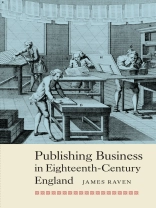Many more people encountered newspapers, business press products or jobbing print than the glamorous books of the Enlightenment. This book looks at the way in which print effected a business revolution.
Publishing Business in Eighteenth-Century England assesses the contribution of the business press and the publication of print to the economic transformation of England. The impact of non-book printing has been long neglected. A raft of jobbing work serviced commerce and finance while many more practical guides and more ephemeral pamphlets on trade and investment were read than the books that we now associate with the foundations of modern politicaleconomy. A pivotal change in the book trades, apparent from the late seventeenth century, was the increased separation of printers from bookseller-publishers, from the skilled artisan to the bookseller-financier who might have noprior training in the printing house but who took up the sale of publications as another commodity. This book examines the broader social relationship between publication and the practical conduct of trade; the book asks what itmeant to be ‘published’ and how print, text and image related to the involvement of script.
The age of Enlightenment was an age of astonishing commercial and financial transformation offering printers and the business press new market opportunities. Print helped to effect a business revolution. The reliability, reputation, regularity, authority and familiarity of print increased trust and confidence and changed attitudes and behaviours. New modes of publication and the wide-ranging products of printing houses had huge implications for the way lives were managed, regulated and recorded.
JAMES RAVEN is Professor of Modern History at the University of Essex and a Fellow of Magdalene College Cambridge.
Inhoudsopgave
The Mediation of the Press
England and the Uneven Economic Miracle
The Printed and the Printers
Serviced by Stationery and Printing
Printing and the City of London
Advertising
The Advertisers
Intelligence
Instruction and Guidance
Widening Discussion
Business, Publishing and the Gentleman Reader
Conclusion
Select Bibliography
Over de auteur
James Raven is a Fellow of Magdalene College, University of Cambridge, and a Fellow of the British Academy, the Society of Antiquaries, and the Royal Historical Society. He was previously Professor of Modern History at the University of Essex, and Professorial Fellow and Reader in Social and Cultural History, University of Oxford.












